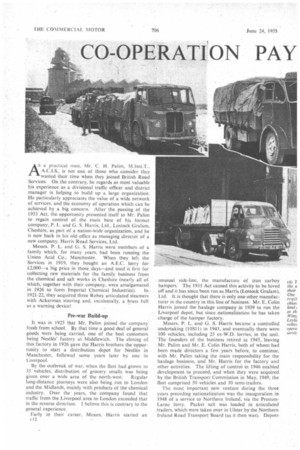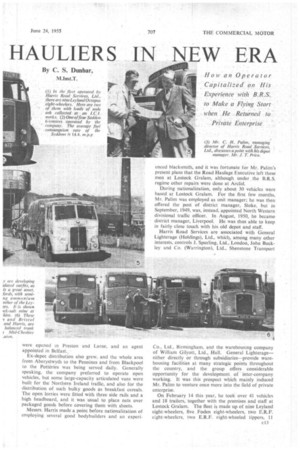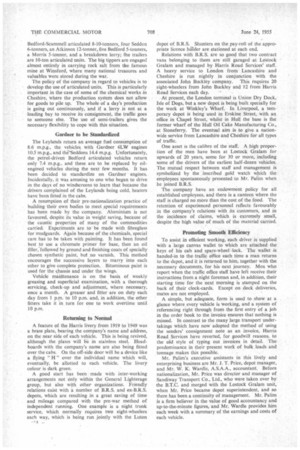CO-OPERATION PAY HAULIERS IN NEW ERA
Page 52

Page 53

Page 54

If you've noticed an error in this article please click here to report it so we can fix it.
By C. S. Dunbar,
Minst.T.
ASa practical man, Mr. C. H. Palim, M.Inst.T., A.C.1.S., is not one of those who consider they wasted their time when they joined British Road Services. On the contrary, he regards as most valuable his experience as a divisional traffic officer and district manager in helping to build up a large organization. He particularly appreciates the value of a wide network of services, and the economy of operation which can be achieved by a big concern. After the passing of the 1953 Act, the opportunity presented itself to Mr. Palim to regain control of the main base of his former company, P. L. and G. S. Harris, Ltd., Lostock Gralam, Cheshire, as part of a nation-wide organization, and he is now back in his old office as managing director of a new company, Harris Road Services, Ltd.
Messrs. P. L. and G. S. Harris were members of a family which, for many years, had been running the Union Acid Co., Manchester. When they left the Services in 1919, they bought an A.E.C. lorry for £2,000—a big price in those days—and used it first for collecting raw materials for the family business from the chemical and salt works in Cheshire (nearly all of which, together with their company, were amalgamated in 1926 to form Imperial Chemical Industries). In 1921-22, they acquired three Robey articulated steamers with Ackerman steering and, incidentally, a brass bell as a warning device!
Pre-war Build-up
It was in 1925 that Mr. Palim joined the company fresh from school. 13y that time a good deal of general goods were being carried, one of the best customers being Nestles' factory at Middlewich. The closing of this factory in 1926 gave the Harris brothers the opportunity to start a distribution depot for Nestles in Manchester, followed some years later by one in Ili verpool.
By the outbreak of war, when the fleet had grown to 35 vehicles, distribution of grocery smalls was being given over a wide area of the north-west. Regular long-distance journeys were also being run to London and the Midlands, mainly with products of the chemical industry. Over the years, the company found that traffic from the Liverpool area to London exceeded that in the reverse direction. I believe this is contrary to the general experience.
Early in their career, Messrs. Harris started an unusual side-line, the manufacture of iron carboy hampers. The 1933 Act caused this activity to be hived off and it has since been run as Harris (Lostock Crralam), Ltd. It is thought that there is only one other manufacturer in the country in this line of business. Mr. E. Colin Harris joined the haulage company in 1939 to run the Liverpool depot, but since nationalization he has taken charge of the hamper factory.
Messrs. P. L. and G. S. Harris became a controlled undertaking (10S11) in 1943, and eventually there were 100 vehicles, including 25 ex-W.D. lorries, in the unit. The founders of the business retired in 1945, leaving Mr. Palim and Mr. E. Colin Harris, both of whom had been made directors a few years before, to continue, with Mr. Palim taking the main responsibility for the haulage business. and Mr. Harris for the factory and other activities. The lifting of control in 1946 enabled development to proceed, and when they were acquired by the British Transport Commission in May, 1949, the fleet comprised 50 vehicles and 30 semi-trailers.
The most important new venture during the three years preceding nationalization was the inauguration in 1948 of a service to Northern Ireland, via the PrestonLarne ferry. Packet salt was loaded in articulated trailers, which were taken over in Ulster by the Northern Ireland Road Transport Board (as it then was). Depots were opened in Preston and Larne, and an agent appointed in Belfast.. •
Ex-depot distribution also grew, and the whole area from Aberystwyth to the Pennines and from Blackpool to the Potteries was being served daily. Generally speaking, the company preferred to operate open vehicles, but some large-capacity articulated vans were built for the Northern Ireland traffic, and also for the distribution of such bulky goods ds breakfast cereals. The open lorries were fitted with three side rails and a high headboard, and it was usual to place nets over packaged goods before covering them with sheets.
Messrs. Harris made a point before nationalization of employing several good bodybuilders and an experi enced blacksmith, and it was fortunate for Mr. Palim's present plans that the Road Haulage Executive left these men at Lostock Gralam, although under, the B.R.S. regime other repairs were done at Arclid.
During nationalization, only about 30 vehicles were based at Lostock Gralam. For the first few months, Mr. Palim was employed as unit manager; he was then offered the post of district manager, Stoke, but in September, 1949, was, instead, appointed North Western divisional traffic officer. In August, 1950, he became district manager, Liverpool. He was thus able to keep in fairly close touch with his old depot and staff.
Harris Road Services are associated with General Lighterage (Holdings), Ltd., which, among many other interests, controls J. Spurting, Ltd., London, John Buckley and Co. (Warrington), Ltd., Shenstone Transport Co.. Ltd., Birmingham, and the warehousing company of William Gilyott, Ltd., Hull. General Lighterage— either directly or through subsidiaries—provide warehousing facilities at many strategic points throughout the country, and the group offers considerable opportunity for the development of inter-company working. It was this prospect which mainly induced Mr. Palim to venture once more into the field of private enterprise.
On February 14 this year, he took over 41 vehicles and 18 trailers, together with the premises and staff at Lostock Gralam. The fleet is made up of nine Leyland eight-wheelers, five Foden eight-wheelers, two E.R.F. eight-wheelers, two E.R.F. eight-wheeled tippers, 11 Bedford-Scammell articulated 8-10-tonners, four Seddon 6-tonners, an Atkinson 12-tonner, five Bedford 5-tormers, a Morris 5-tonner, and a breakdown lorry; fhe trailers are 10-ton articulated units. The big tippers are engaged almost entirety in carrying rock salt from the famous mine at Winsford, where many national treasures and valuables were stored during the war.
The policy of the company in regard to vehicles is to develop the use of articulated units. This is particularly important in the case of some of the chemical works in Cheshire, where the production system does not allow for goods to pile up. The whole of a day's production is going out continuously, and if a lorry is not at a loading bay to receive its consignment, the traffic goes to someone else. The use of semi-trailers gives the necessary flexibility to cope with this situation.
Gardner to be Standardized The Leylands return an average fuel consumption of 8.6 rn.p_g., the vehicles with Gardner 6LW engines 10.5 m.p.g., and thesSeddons 14.4 m.p.g. Unfortunately, the petrol-driven Bedford articulated vehicles return only 7.4 m.p.g., and these are to be replaced by oilengined vehicles during the next few months. It has been decided to standardize on Gardner engines. Incidentally, it was amusing to one who began to drive in the days of no windscreens to learn that because the drivers complained of the Leylands being cold, heaters have been fitted in the cabs.
A resumption of their pre-nationalization practice of building their own bodies to meet special requirements has been made by the company. Aluminium is not favoured, despite its value in weight saving, because of the caustic properties of many of the commodities carried. Experiments are to be made with fibreglass for mudguards. Again because of the chemicals, special care has to be taken with painting. It has been found best to use a chromate primer for base, then an oil filler, followed by ground and finishing coats of specially chosen synthetic paint, but no varnish. This method encourages the successive layers to marry into each other to give complete protection. Bituminous paint is used for the chassis and under the wings.
Vehicle maintenance is on the basis of weekly greasing and superficial examination, with a thorough servicing, check-up and adjustment, where necessary, once a month. A greaser and fitter are on duty each day from 1 p.m. to 10 p.m. and, in addition, the other fitters take it in turn for one to work overtime until 10 p.m.
Returning to Normal A feature of the Harris livery from 1919 to 1949 was a brass plate, bearing the company's name and address, on the near side of each vehicle. This is being revived, although the plates will be in stainless steel. Headboards with the company's name are also being fitted over the cabs. On the off-side door will be a device like a flying "H" over the individual name which will, eventually, be allotted to each vehicle. The livery colour is dark green.
A good start has been made with inter-working arrangements not Only within the General Lighterage group, but also with other organizations. Friendly relations exist with a number of B.R.S. and ex-B.R.S. depots, which are resulting in a great saving of time and mileage compared with the pre-war method of independent running. One example is a night trunk service, which normally requires two eight-wheelers each way, which is being run jointly with the Luton depot of B.R.S. Shunters on the pay-roll of the appropriate licence holder are stationed at each end.
Relations with B.R.S. are so good that two contract vans belonging to them are still garaged at Lostock Gralam and managed by Harris Road Services' staff. A heavy service to London from Lancashire and Cheshire is run nightly in conjunction with the associated John Buckley company. This requires 20 eight-wheelers from John Buckley and 12 from Harris Road Services each day.
At present, the London terminal is Union Dry Dock, Isle of Dogs, but a new depot is being built specially for the work at Winkley's Wharf. In Liverpool, a temporary depot is being used in Erskine Street, with an office in Chapel Street, whilst in Hull the base is the former wharf of the Hull Oil Cake Manufacturing Co., at Stoneferry. The eventual aim is to give a nationwide service from Lancashire and Cheshire for all types of traffic.
One asset is the calibre of the staff. A high proportion of the men have been at Lostock Gralam for upwards of 20 years, some for 30 or more, including some of the drivers of the earliest half-dozen vehicles. The mutual respect between staff and management is symbolized by the inscribed gold watch which the employees spontaneously presented to Mr. Palim when he joined B.R.S.
The company have an endowment policy for all established employees, and there is a canteen where the staff is charged no more than the cost of the food. The retention of experienced personnel reflects favourably in the company's relations with its customers, and in the incidence of claims, which is extremely small, despite the high value of much of the material carried.
Promoting Smooth Efficiency
To assist in efficient working, each driver is supplied with a large canvas wallet to which are attached the keys of his cab and spare-wheel leek. The wallet is handed-in to the traffic office each time a man returns to the depot, and it is returned to him, together with the necessary documents, for his next journey. Men who report when the traffic office staff have left receive their instructions from a night foreman and, in addition, their starting time for the next morning is stamped on the back of their clock-cards. Except on dock deliveries, mates are not employed.
A simple, but adequate, form is used to show at a glance where every vehicle is working, and a system of referencing right through from the first entry of a job in the order book to the invoice ensures that nothing is missed. In contrast to the many large transport undertakings which have now adopted the method of using the senders' consignment note as an invoice, Harris Road Services have reverted, for goodwill reasons, to the old style of typing out invoices in detail. The predominance in their present work of bulk loads and tonnage makes this possible.
Mr. Palim's executive assistants in this lively and enterprising business are Mr. J. T. Price, depot manager, and Mr. W. K. Wardle, A.S.A.A., accountant. Before nationalization, Mr. Price was director and manager of Sandiway Transport Co., Ltd., who were taken over by the B.T.C. and merged with the Lostock Gralam unit, when Mr. Price became depot superintendent, and so there has been a continuity of management. Mr. Palim is a firm believer in the value of good accountancy and up-to-the-minute figures, and Mr. Wardle provides him each week with a summary of the earnings and costs of each vehicle.








































































































